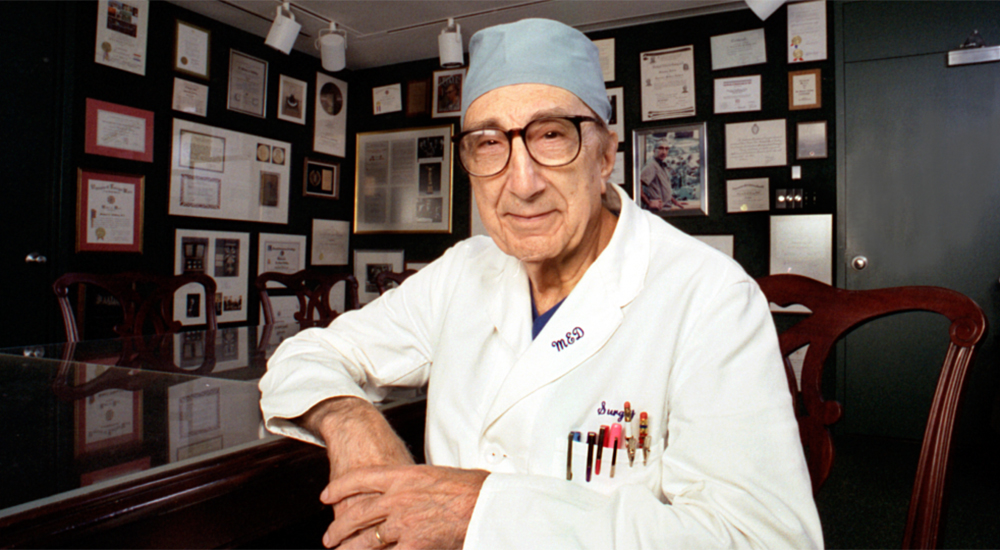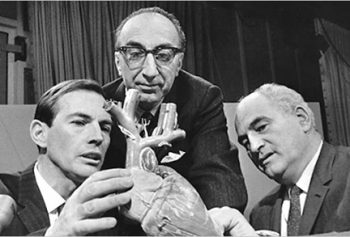February marks American Heart Month. Perhaps there’s no better time to celebrate the accomplishments of world-renowned physician, educator, innovator and Veteran, Dr. Michael E. DeBakey (pictured above). DeBakey revolutionized the field of cardiovascular surgery.
DeBakey was born in Louisiana on Sept. 7, 1908, to Lebanese immigrant parents. He joined the Army in 1942, following America’s entrance into World War II. Briefly, he served as a surgeon in Mississippi. He transitioned to the Surgeon General’s Office as a staff officer in the Surgical Consultants Division for the remainder of the war.
As a staff officer, he helped initiate policy on treating trench foot. That’s a painful condition soldiers suffered from having their feet immersed in cold water or mud for long periods of time. In 1945, DeBakey received the Legion of Merit medal for his help in the formation of mobile army surgical hospitals, or M.A.S.H. units.
Great strides in cardiovascular surgery
After the war in 1949, DeBakey continued his pursuit of military medicine at the Houston VA Hospital. He helped the Hoover Commission as a medical advocate and consultant for the government. Throughout his time at the Houston VA, DeBakey made great strides in the advancement of cardiovascular surgery. He created the Dacron® prosthetic artery from fabric purchased from a local store and a sewing machine.
A leading surgeon, DeBakey performed complex and life-saving surgeries such as the resection and homograft replacement of an aneurysm of the abdominal aorta. He further experimented with vascular surgery techniques, successfully removing a blockage in a patient’s neck which ushered in the modern era of the surgical treatment of stroke.
In 1963, DeBakey received the Albert Lasker Award for Clinical Research for his commitment to “the correction and cure of previously incurable cardiovascular disease.” A testament to his tenacity, he successfully performed the first coronary bypass in 1964. DeBakey’s name was now synonymous with impressive surgical feats. In 1965, his photo graced the cover of Time magazine.
Over 60,000 surgeries
During his career, DeBakey performed over 60,000 surgeries and published over 1,700 articles. While his contributions extend far beyond the military community, DeBakey always retained a reverence and passion for serving Veterans. Drawing upon his experience, in 1996 he wrote about the importance of applying “the lessons of the past to future medical practice” to better “the care of military personnel.”
In 2003, the Houston VA Hospital was renamed the Michael E. DeBakey Veterans Affairs Medical Center. President George W. Bush awarded DeBakey the Congressional Gold Medal on Oct. 16, 2007. This solidified the illustrious “rebuilder of hearts” as an American medical hero.
On July 11, 2008, DeBakey died from natural causes. His legacy lives on today through the countless lives his pioneering techniques have saved. He is buried at Arlington National Cemetery.
To learn how to celebrate the 57th anniversary American Heart Month and ways to focus on a healthy heart, visit the American Heart Association website.
Parker Beverly is a VA History Office intern and Wake Forest undergraduate.
Topics in this story
More Stories
Each year, I return to honor my old corpsman's memory and reflect on serving together.
Veteran was trained to collaborate with fellow Airmen. Having his buddy’s six was important, and still is.
It’s essential for Veterans to take action and prepare for tornados and spring storms while staying informed.







